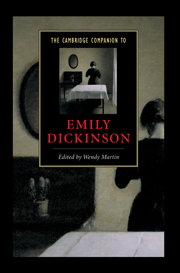9 - Emily Dickinson and popular culture
from Part 3 - Cultural contexts
Published online by Cambridge University Press: 28 May 2006
Summary
Although the myth of Dickinson's alienation from her society is slowly dissolving, it has not been sufficiently recognized just how open she was to forces within her surrounding culture. In some ways, of course, Dickinson was the quintessentially private poet. It is also important to note, however, that she had a keen eye on American popular culture and drew poetic sustenance from it.
Indeed, there is evidence that she had a deep, frustrated desire for popularity. As a family acquaintance, Mrs. Ford, wrote to Mabel Todd, “I think in spite of her seclusion, she was longing for poetic sympathy and renown, and that some of her later habit of life originated in this suppressed and ungratified desire for distinction.” Dickinson herself did at times express this desire for fame, as when she remarked to her sister-in-law Sue, “Could I make you and Austin – proud – sometime – a great way off – ‘twould give me taller feet – ’” (LED, p. 378). She once recalled that she and her cousin Louise Norcross had “in the dining-room decided to be distinguished. It’s a great thing to be great, ‘Loo,’” she remarked. Although she could adopt a pose of literary shyness before the Atlantic Monthly editor Thomas Wentworth Higginson, writing to him that publication was as “foreign to my thought, as Firmament to Fin,” the fact remains that she sent this leading man of letters six poems in response to his call for pieces from “new or obscure contributors” (LED, pp. 378, 539). Her thirst for fame and popularity sometimes surfaces in her poems, as when she writes that her “Holiday” will be “That They remember me,” and her “Paradise” will be “the fame – / That They – pronounce my name –” (J 431).
- Type
- Chapter
- Information
- The Cambridge Companion to Emily Dickinson , pp. 167 - 190Publisher: Cambridge University PressPrint publication year: 2002
- 4
- Cited by

